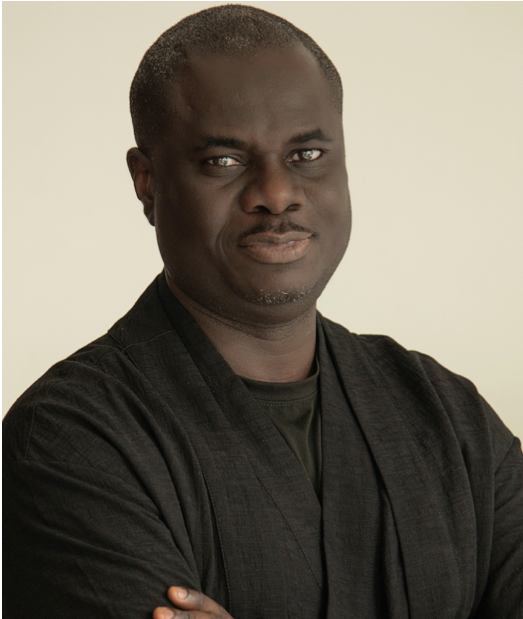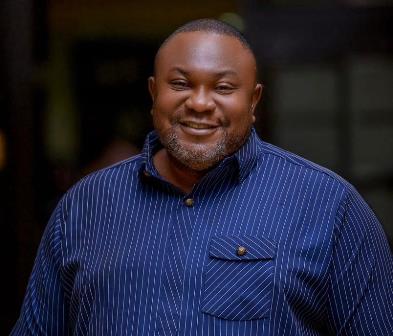After decades in the film industry, filmmaker Chris Ihidero is finally stepping into his most personal project, a story shaped by the environment that raised him and his deep concerns about society, Vanessa Obioha writes
There’s a particular story that the filmmaker and director Chris Ihidero has always wanted to tell, one that captures the everyday life of the urban ghetto, an environment he knows all too well. Born in Oshodi, Lagos, Ihidero is no stranger to the gritty realities of inner-city life. Though he spent only seven years there, the experience left a lasting impression.
He vividly recalls ram-fighting contests at a secondary school and one particular ram that stood out.
“There was a major ram in all of Oshodi called Black Power because it was black. It had no white spots on its body. It was black and old. By the time I was born, the ram was already five years old. So by the time I grew up, it was 10. But it was the champion of the field, and it used to eat bread,” he said on a cloudy Friday morning at a bistro in Ikeja GRA, where we met.
Other moments from that time still linger such as watching area boys on the streets or learning to recite Quranic prayers taught to Muslim students.
“That was my world.”
The street became even more familiar during his secondary school years. It was then he earned the nickname ‘No Bone’ because, as he puts it:
“I used to dance as if there was no bone in my body.”
He was also described as a brilliant but rebellious student.
“I refused to wear trousers as a senior student. It makes no sense to me to wear trousers just because I’m a senior, does that make the junior ones who wear shorts lesser beings?”
This rebellion, he clarified, wasn’t born from pride but from concern for the underprivileged. He now calls such actions “stupid” in hindsight.
“I’m the kind of person that during rallies, I would hold a policeman’s gun and tell him that he can’t do anything, which was stupid because if I had been shot, nothing would have happened.”
As he matured, Ihidero learned a different kind of activism, one shaped by Professor Tunji Azeez of Lagos State University. From him, he discovered that the brain is a mightier weapon than the hands and that he needed to develop his intellect so the world would listen when he speaks with confidence. This wisdom led him to writing.
“I would write an article per week in school. After a while, it became a must-read every Monday morning. And then I became an actor. We had a troupe called Optimum Arts Consortium, of which I was a member. It was also there I met the veteran actor Ropo Ewenla. Ropo and Tunji are like five and six, so they became my big brothers and my mentors. That formed my concerns for society.”
That ideology shapes the basis of the film he’s long wanted to make.
“I call it a love story in a time of war. A war between those who have and those who don’t. And those who’ve always taken from those who don’t. Then, you know, a boy and a girl from both sides fall in love in the middle.”
As he recounted these experiences, his passion was so palpable. Every word was deliberately punctuated as if his life depended on it, and every gesture carried a sense of urgency.
Ihidero is finally ready to tell this story. He began developing it in 2016, started writing during the pandemic, finished the first draft in 2023, and only began hinting at it publicly in February. Yet he remains tight-lipped about the project.
“It’s taking so long for it to come to fruition. I wanted to make sure everything that I wanted to do was done the way I wanted to do it,” he explained.
“And you know that thing when you’ve done pretty much everything,” he continued, reeling out productions he has spearheaded, such as the MTV Base Foundation lifestyle series ‘Shuga.’ He was also the head writer/editor of MNet’s TV drama ‘Hush’ and even directed Nigeria’s first animation, ‘Lady Buckit and the Motley Monsters.’ “But you get to a point in your career, and you know that this one, if I can deliver this one the way I think I can, this is it.”
Even more compelling, he gets to set the film in his favourite world.
“It’s set in an urban ghetto. When we think of a ghetto, we think of Ajegunle or Amukoko, but Fadeyi is a ghetto. Shomolu is a ghetto. Oshodi is a ghetto, but more urban. So this story is set in an urban ghetto, right? All the experiences I had as a kid growing up in these places are there.
“And then I schooled in Ijebu-Ode which is a glorified ghetto. Some of my classmates had either failed at other privileged schools here or in England, and their parents just dumped them in my school or even wanted them to have a Nigerian experience. They would dump them in this place where you had to survive.
“There was no seniority in my secondary school, if you’re in SS3 and an SS2 boy can beat you, the SS2 boy begins to roll with the seniors. It’s what it is. It was a jungle. The concerns of the poor have always been on my mind because I didn’t grow up rich. We were not poor, but we were not rich. We survived from time to time.”
A graduate of Literature-in-English from Lagos State University (LASU), Ihidero is very passionate about filmmaking having had the opportunity to learn from the late Amaka Igwe in 2007. He has directed over 100 hours on TV and made the award-winning short film about rape ‘Big Daddy.’ Before he veered into filmmaking, he worked as a theatre artist, a journalist both in the broadcast and print media and a university lecturer.
Like his mentor Igwe, most of his films centre on everyday people, capturing the inequalities in society.
“My teacher, the late Amaka Igwe used to say that you can’t write yourself out of your reality,” he said. “Therefore, every time you write, you are writing yourself, whether you know it or not. So you would see reflections of me, but more than that, it’s my concerns about society. How have the poor remain perpetually poor, while the rich keep getting richer? And when the poor have a little, the rich still take. Why do we allow it? And if we were going to fight, who should we be? Can our fight be true?”
To him, the world will always be unbalanced.
“That’s why the idea of heaven is alluring,” he added. Still, he doesn’t believe in escapism.
“Every time we are happy, sadness is at the door. Every time we are sad, happiness is at the window. I think that where we find peace is in acknowledging the unfairness and then trying our best as individuals, as a collective, and as a society, to make the impact of that imbalance, that unfairness to be less on the underprivileged in society, I think that we miss the mark when we think that we can create an equal society. It does not exist anywhere.”
As principal photography begins and post-production is planned across Europe, Ihidero is taking an unconventional approach to promoting his film. Rather than sharing too many details, he’s been speaking more broadly about industry challenges such as NTA’s decline, and his views on funding in Nollywood. We revisited the latter against the backdrop of the presumed exit of streaming platforms Netflix and Amazon.
In his view, Nollywood’s global relevance is undeniable but filmmakers need to rethink their business model.
“Historically, Nollywood tends to face one direction at every time. So, let’s go back to when Nollywood kicked off. Our major outlets were the markets: Alaba market, Upper Iweka, Pound Road, Onitsha market. Those were our outlets through VCDs. And then when that stopped working, it became Africa Magic. If you didn’t sell your film to Africa Magic at that time, you had no outlet, because piracy was significant.
“After a while, Africa Magic licensing fee became what it became. And iROKO came on board. Jason (Njoku) went to Alaba, bought those 4000 films and kicked off iROKO which became the place you went to, right? As iROKO tailed off, came the cinemas. If you did not take your film to the cinema, you had no other model of distribution. And then the cinemas did their own thing. They put the films that they liked there. They have blah, blah, blah, blah, all of those things happened.
“And then Netflix and Amazon came and became the focus. So, at every point in time, we are facing one direction, and what that means is that your risk keeps increasing. If that one thing is pulled away, then you fall which is why everybody is now making it look like Netflix and Amazon pulling back is a big deal. The Yorubas will say that before corn was invented, the chicken ate something. What is it that we were eating before Netflix and Amazon were invented? We were not starving. We may be at a different level, but we’re not starving.”
For the filmmaker who is also the CEO of PinPoint Media, the real way forward is investment, not grants.
“You cannot grow a creative industry through grants, because when you give people grants, they become comfortable. An industry is grown by people who are uncomfortable,” he argued.
“What we need to grow the industry is investment. An investment that requires the filmmaker in whom the investment has been made to return the money.”
He emphasized the need for investor accountability: “I am making a film now that an investment company has raised the money for me. Part of that money is equity, and part of it is debt. So I have to return that money, and because of that, it is going to have a bearing on what script I write, on how I cast, on how I shoot, because it is an investment vehicle.”
Many of the values and principles Ihidero lives by are those he learnt from his mentors, especially the late Igwe. He rarely speaks of the industry or his craft without mentioning her. Such respect is so rare that it’s almost unbelievable that one can leave such a lasting imprint on another soul. But for Ihidero, he is a proud protégé of the legendary storyteller. The film, he said, will be dedicated to her.
“A lot of people knew Amaka Igwe as the writer, producer and director. A lot of people did not know her as a person. If people knew her as a person, they would realise that the last thing she wants is anybody publicly honouring her. She was a very shy person even though she had a public face.
“The greatest honour I can give her is to make an amazing film,” he concluded.


















Leave a comment